




Set Within the “Snackville” Food
Come from a Michelin-Starred Chef
Pacific Park on the Santa Monica Pier is set to unveil “Snackville,” a food area featuring five culinary concepts by Michelin-starred Chef James Kent. The grand opening is scheduled for Friday, June 7.
Situated at what was formerly Pacific Park’s oceanfront food plaza, “Snackville” introduces five new dining options:
• Smashie’s Burgers: Offering smash burgers, loaded hot dogs, and fries, Smashie’s features charbroiled burgers topped with American cheese, grilled onions, and Smashie Sauce.
• Mr. Nice Fry: Serving a variety of fries, including Skinny Dippers, Swirly Fries, and Tater Wheels, with a selection of dipping sauces and seasonings.
• eegee’s: This Arizona beverage
staple debuts in California with real fruit and frozen drinks.
• Churrita Churro: Providing options like cinnamon-sprinkled, dulce de leche-filled, and chocolate-dipped churros, with or without soft-serve ice cream.
• Scoops Creamery: Serving handscooped ice cream, milkshakes, sundaes, Dippin’ Dots, and funnel cakes topped with Lappert’s premium ice cream.
• Cosmic Funnel Cake: Known for its signature funnel cakes, served with various toppings like powdered sugar, strawberries, whipped cream, or ice cream.
SC Holdings, which recently acquired the operating group of Pacific Park, has committed $10 million in capital investments over the next five years. This funding will enhance food and entertainment programs, ensuring Pacific Park remains a vibrant destination for tourists and the local community.
Chef James Kent’s culinary journey includes prestigious establishments such as Bouley, Babbo, and Eleven Madison Park, where he earned three Michelin stars. His own ventures, Crown Shy and SAGA in New York, have also garnered Michelin stars.
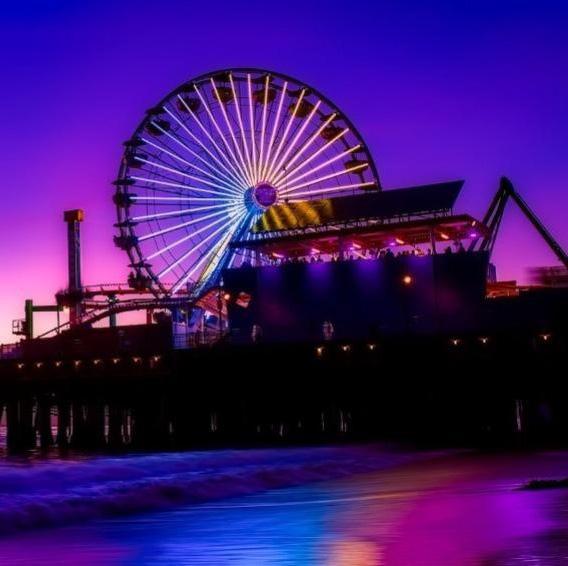
Holey Moley’s Courses Feature
A mini golf chain, with fun and unique creative concepts, is set to open a new outpost on Third Street Promenade, according to a report by What Now Los Angeles.
Holey Moley, which is owned by Australian entertainment company Funlab, will establish the location within The Gallery Food Hall’s former space at 1315 3rd St. An opening date has not been
disclosed at the time of this writing.
As opposed to the typical putt-putt decor of windmills and castles, Holey Moley’s courses feature different artistic themes and pop-culture references for each hole.
At the “Makin it Rain” hole, the putter must navigate his or her ball around scattered dollar bills. The “Arty Party” hole is reminiscent of an art gallery, set within the confines of white halls which are adorned with iconic paintings.
The news comes a year after Holey Moley’s first U.S. locations were launched in Austin and Denver, with a subsequent Houston spot opening in April and plans in motion for a San Francisco outpost, reported What Now. Private karaoke rooms are also available for reservation.
To find out more about Holey Moley, go to https://www.holeymoley.com/.

Construction is underway for the new “Bezdek Center for the Performing Arts”: a 55,000-square-foot complex at the Crossroads School for Arts & Sciences prep school in Santa Monica.
Set for completion by early 2026, the building will feature a 650-seat auditorium and 100-person recital hall, in addition to several filmmaking, rehearsal and music instruction spaces.
Opening to a sleek courtyard, the structure’s design integrates inspiration from music and performance such as the body of a violin and the bell of a trumpet while the exterior’s corrugated aluminum panels evoke the texture of stage curtains. Situated at the heart of the center will be the “Crossroads School Equity & Justice Institute.”
Founded in 1971, Crossroads prides itself on incubating creativity; with an accomplished arts program that has sent some of its students to display their work at venues such as Carnegie Hall or the local Laemelle Theater.
The college preparatory school is also known for a student body consisting of

celebrities’ children such as those of Lebron James and Elon Musk, while numerous alumni have become A-listers themselves such as Gwyneth Paltrow and Kate Hudson.
Los Angeles-based architectural firm Studio Pali Fekete Architects (SPF:a) was tapped by Crossroads for the design of BCPA.
The award-winning firm is known for its creative integration of geometric shapes and, one could say, futuristic designs into its projects. SPF:a’s portfolio includes The “Michelle and
On Wednesday, July 17, the
acclaimed book, “Santa Monica Pier: America’s Last Great Pleasure Pier.”
The Santa Monica Pier, a symbol of resilience and adaptability, has withstood natural forces and political challenges throughout its history. Beyond being a tourist attraction, it represents a tangible piece of history that embodies the spirit of California.
The new edition of Harris’s book features a foreword by Robert Redford, a staunch advocate for the pier’s preservation during turbulent times. This edition is regarded as a definitive
Barack Obama Sports Complex” in the Baldwin Hills neighborhood of L.A., the “Wonder Bridge” (whose spiraling green design evokes the curl of a lizard’s tail) in Lost Hills, CA, and the “Julia Morgan YWCA Harbor Area & South Bay Housing” project in San Pedro.
Describing Crossroads’ current facilities as “surprisingly austere” with its “music program and administration facilities similarly bulging at the seams”, SPF:a believes it’s up to the task of creating a facility that reflects the school’s embrace of creativity.
“Our design attempts to fit into and preserve the spirit of the industrial use prevalent in the site’s history … A new 650-seat auditorium anchors a network of practice rooms, rehearsal spaces, seminar rooms, and storage areas.” SPF:a states on its websites in reference to BCPA. “A new flexible-use open-air lobby connects the 100-person Cummins recital hall, filmmaking space, and electronic music classroom building to the main auditorium building.”
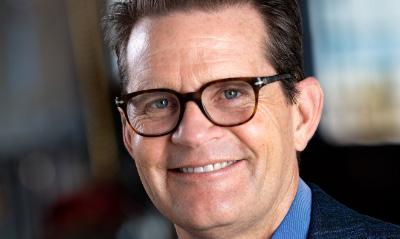
account of the pier’s rich history and cultural significance.
James Harris, an accomplished executive and producer, has extensive experience in event concepts and management, facility and venue rentals, and nonprofit management. As the official historian and Executive Director



















A now-viral video shows a local store manager breaking into a furious rage at a suspected shoplifter.
The footage captures the moment that Amber Jolly, a store manager at Gramercy Boutique located at the intersection of 14th Street and Montana Avenue, confronted an individual who alleged shoplifting a tote bag full of clothes. In the video, Jolly can be heard screaming “You give me my jacket right now!” and “Don’t steal from my f—g store!” at the alleged thief.
“What compelled me is that I know the owner works very hard to keep this business open.” Jolly said in an
interview with local news station KCAL News. “Businesses are closing left and right because of all this looting going on. The system’s broken. Nothing is being done about it.”
According to KCAL, SMPD did not immediately confirm a police report was issued over the incident and that the store’s owner told Jolly her confrontational behavior was not necessary.
Businesses located along the retailheavy Montana Avenue in Santa Monica have been the target of several robberies in the past year.
In September of 2023, weeks before a suspect pointed a firearm at employees and robbed the First Citizens Bank location on the tree-lined street, three dining spots on Montana Ave. were broken into by suspects described as wearing ski masks and fleeing in a darkcolored sedan. The thieves smashed windows of all three locations, which included those of frozen yogurt franchise Pinkberry and coffeehouse Bardonna, while vegan restaurant Margo’s was also robbed of several thousand dollars in cash.

Its Founder Said He Relinquished Control of the Nonprofit and Its Collection to the Museum’s Chief Executive
A slew of controversies around founder Huston Huddleston, including a child porn conviction, surrounds Santa Monica’s new Sci-Fi World museum, according to a new report by the Los Angeles Times.
Huddleston, a “Star Trek” superfan, claimed to have salvaged a replica of the “Star Trek: The Next Generation” bridge from a Long Beach warehouse in 2011, launching Kickstarter campaigns that raised nearly $163,000 to restore it and establish the museum. However, Huddleston’s 2018 conviction for possession of child pornography has
cast a shadow over the project, as reported by The Times.
Huddleston, 54, says he relinquished control of the nonprofit and its collection to the museum’s chief executive due to the potential negative impact of his conviction. Nevertheless, former volunteers told The Times that Huddleston remains deeply involved in the museum’s operations.
Concerns about leadership intensified following the resignations of Chief Executive John Purdy and General Manager Cory Dacy. Purdy cited Huddleston’s violation of their contractual agreement, while Dacy noted Huddleston’s regular presence onsite, a claim Huddleston disputes. Further complicating matters, CBS Studios has issued a cease and desist letter to Huddleston and Purdy, alleging unauthorized use of “Star Trek” elements, according to The Times. The museum’s red-carpet gala, initially planned as a grand opening, was relegated to the parking lot due to permitting issues.


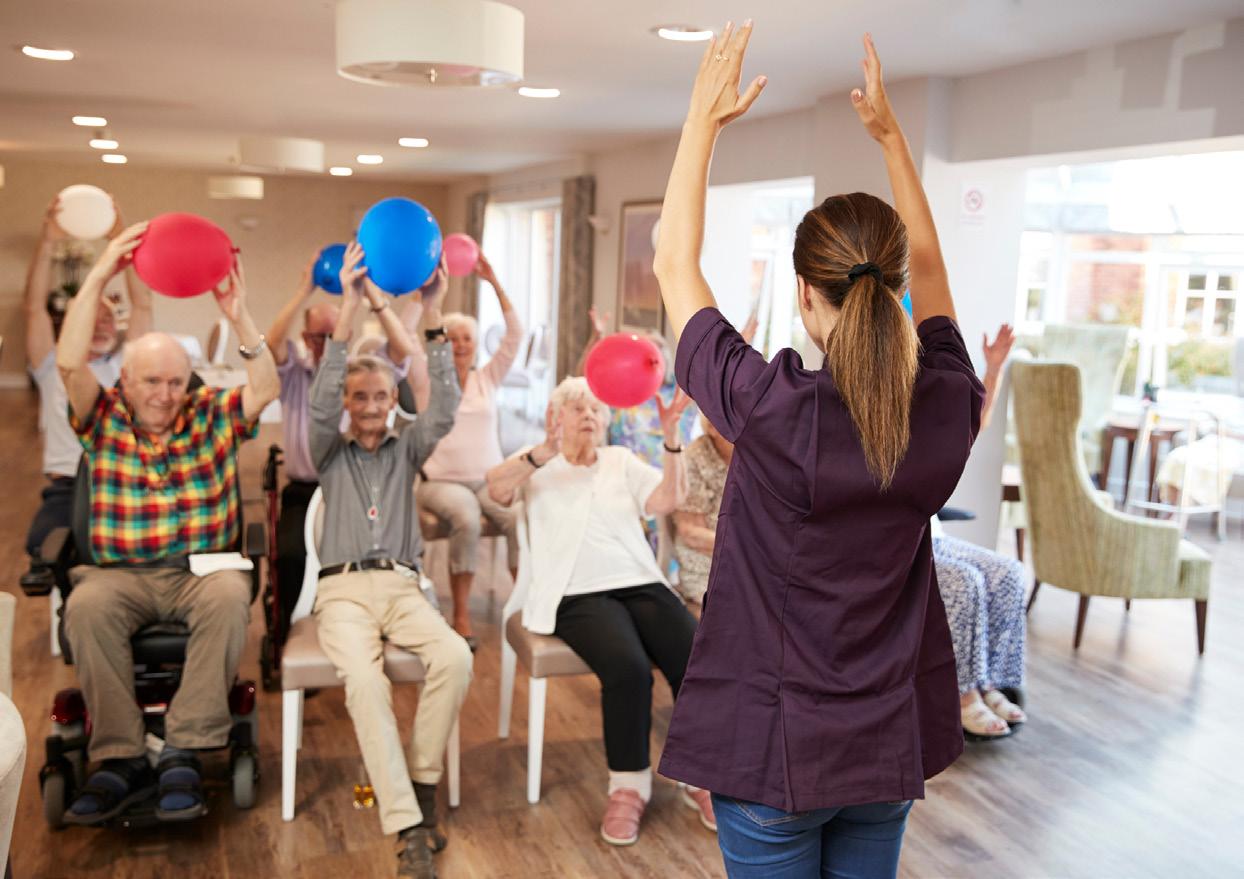



Santa Monica Architects for a Responsible Tomorrow
Nine years ago, SMa.r.t wrote a series of articles addressing the adaptive re-use of existing structures. We titled one “Shape Up,” analogizing development with bodybuildingphysical fitness. Lots of life left in the old bones, and with the proper diet and physical effort, a long, healthy life ahead, both for the structure as well as the impact on the environment, the residents, and their quality of life.
In revisiting those articles these several years later, it becomes even more clear how unfortunate that ideologically driven city councils never pushed back when developers began to influence state legislation and housing density laws. We are now confronted with state laws that allow developers to far exceed our zoning height and density regulations, and we clearly see the results springing up all around what used to be our very livable, low-rise beachfront town.
Now, in what would seem to be about nine years late, the city has formed an Adaptive Re-use Technical Working Group to study… adaptive re-use. Perhaps some of our earlier observations and concepts can find their way into whatever net result may evolve, though state allowances will almost certainly continue to push developers to maximize building, with little regard to livability or the environment
developments to then double the code-allowed number of units. And then, with another small number of “moderate income” units, can then double the double. And the city can’t say no. But, we will see what, or if, the Adaptive Re-use Working Group can, in fact, make a difference in the ‘tear down and build to the maximum’ philosophy that has permeated our state and city planners for the last 20 years. There is to be a presentation to the City Council on 6/11 for a new ARO (Adaptive Reuse Ordinance). Let’s hope there can be positive incentives to deter the teardown, build tall, maximize mindset that has obviously been driving development in Santa Monica, and generally with little pushback from the City.
So what is ‘adaptive re-use’? In an earlier column, I wrote, “It’s Re-purposing. Remodeling. Addition. Re-habilitating. Restoring. All these phrases are terms that describe breathing new life into older buildings. Some developers and building industry professionals talk of buildings as having a fifty-year life cycle because maybe the floor creaks and, windows leak, or pipes drip, and energy efficiency is way down. Maybe not unlike looking in the mirror at age 40, seeing a bit of a bulge here and there, lines around the eyes, feeling lethargic and lacking energy, etc. I imagine many of the readers would be disturbed to view themselves as having only a fifty-year lifecycle and, therefore, say it’s time to demo the body. More likely, with the best of intent, it is off to the gym to re-build the body and to restore the energy through a healthy diet.

much fix things as throw them away and buy, or build, new. But there are very few buildings that can’t be economically updated and made energy efficient, and by not tearing down and hauling away debris to a landfill, much more sustainable. There is this trend to justify building new to LEED standards of gold and platinum, etc., and building to those standards is good, but suffice it to say, ‘the greenest building is the one not torn down.’
Additions, energy efficiencies, and seismic upgrades can generally be managed and economically implemented. Had we had a zoning code in place that contained language that encouraged re-purposing buildings to include a percentage of affordable housing, it could have become the perfect poster child for what ideally should occur on the boulevards. Adaptive re-use is probably the most efficient and ‘green’ way to produce more housing, and needn’t result in the taller and taller structures we now see on Lincoln and coming soon to your neighborhood.
So we need a new, healthy, and trim zoning code that says, “Go to the gym and reinvent, get fit, re-energize, breathe deep, and increase the durability, endurance, and life span of our buildings.” Simplify the code, encourage, and incentivize existing office uses to be re-purposed for housing when the opportunity arises. Buildings do not have to face a ‘mid-life’ crisis with the only option one of being removed and replaced by something 4 or 5 times as large that is going to crowd everybody out to the sidewalk and to the surrounding residences, looming over them and casting them in shade for good parts of the day. A healthy environment is one with fresh air and blue skies, especially in a coastline beach community such as ours.
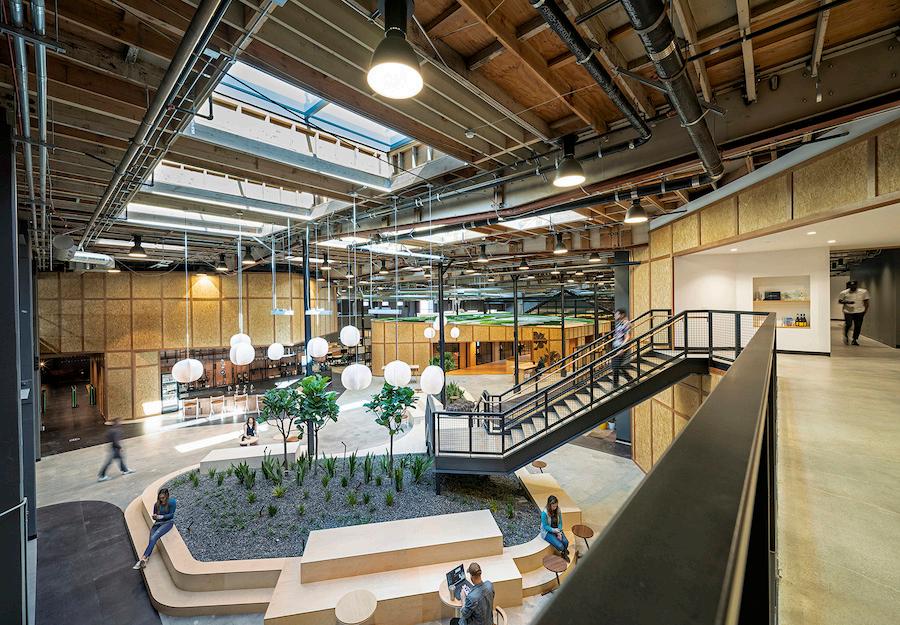
be done as tenant improvements in generally less time it takes to build a new building. Office buildings are usually designed to facilitate the reorganization of their spaces, so this transition is usually not difficult and may not require significantly adding height and area to the existing structure.



Paraphrasing one of our earlier columns, “Santa Monica residents are being squeezed by two related realities: 1) increasing property values affordable only to a small minority, and 2) a lack of low-income affordable housing caused by the City’s housing/job imbalance. This imbalance has been created by four decades of policies that have incentivized commercial over residential construction. Concurrent with the commercial space boom, there has been a rush to create housing for the well-to-do at the expense of “affordable” housing. These units will not be affordable for lower-income residents for three reasons: 1) new construction will always be more expensive than adaptive reuse; 2) the demand for beachfront housing, and the ability of those of higher income to pay the high Santa Monica market rates; and 3) land values and construction costs in our already dense city will continue to escalate because no amount of new housing will result in lower home prices or rents. Even when we deed restrict a small fraction (about 10% on average) of those units to qualified low-income residents, the affordable portion is too small to impact prices in such a competitive marketplace. In other words, we cannot build our way to affordability. If you believe, as we do, that affordable housing is a worthwhile goal, about the only way to create that affordable housing is with subsidies. The question then becomes what kind of subsidy, how big, and for and by whom?
One solution would be, as discussed, for a new planning code to incentivize the conversion of existing office buildings to mixed-use/ residential. This would have several advantages: It’s the fastest, greenest, and least disruptive way to create housing. These conversions could
But, since the State’s intervention, things have changed…along comes the State (think ‘candyman’) with a little ‘juice’ (bonus density laws) that developers have been offered‘anabolic steroids’ to maximize development - get big! Fast! With less hard work and quick ‘results’ - e.g., the State allowable “Bonus Density” laws and the obscure “Builders Remedy,” where, if the State rejects a city’s Housing Element submittal, a developer is essentially permitted to build to virtually any height and size they so desire until such time as the City’s Housing Element is deemed in compliance - so hey!, let’s ’Get High’ on the ‘juice’ and get pumped up. Ignore that in Santa Monica, we have an approximate 10+% vacancy rate, with a declining city and state population, but yet the State requires us to build, at minimum, another 9000 to 13,000 units (about a 25% population increase). And there is not much the city or residents can do about it - except perhaps fight the State in court over the failure of the Bonus Density laws to provide what they were purportedly designed to do - create affordable housing. Don’t work out growth based on a healthy diet of actual datadriven problem-solving design development needs; just get BIG, fast - do it on steroids. But steroids are a drug, and addictive, and have dangerous side effects. Beware!
Bob Taylor, AIA for SMa.r.t.
Send comments to santamonicasmart@ gmail.com
Santa Monica Architects for a Responsible Tomorrow
Robert H. Taylor AIA, Architect; Dan Jansenson, Architect & Building and Fire-Life Safety Commission; Thane Roberts, Architect; Mario Fonda-Bonardi AIA, Architect; Samuel Tolkin Architect & Planning Commissioner; Michael Jolly, AIR-CRE; Marie Standing, Resident; Jack Hillbrand AIA, Architect;
The traditional cardboard yacht regatta, Pride events, summer solstice moments, special adults-only swims, with a variety of sand and beach recreation is set for a summer of fun for all ages at the Annenberg Community Beach House.
For a more raucous kick-off to a Beach House summer the 12th annual all-ages Cardboard Yacht Regatta on Saturday, June 15 from 9 a.m. – 1 p.m. makes waves as two-person teams race themed cardboard and duct tape yachts across the historic pool while spectators cheer them on. Teams must pre-register, and the fee is $20 per team.
The pool will open for daily recreation swimming on Sunday, June 16, through Labor Day, Monday, September 2. Pool hours will be Monday through Thursday from 12 p.m. – 6 p.m. and Friday, Saturday, and Sunday, July 4 and September 2, from 10 a.m. – 6 p.m.
Special events celebrating June’s SaMo PRIDE will include Family PRIDE, free with RSVPs encouraged, on Friday, June 14 and PRIDE Sunset Swim (age 18+) on Friday, June 21.
New this year, Summer Solstice: Big Talk Sunset Picnic on June 20 offers a
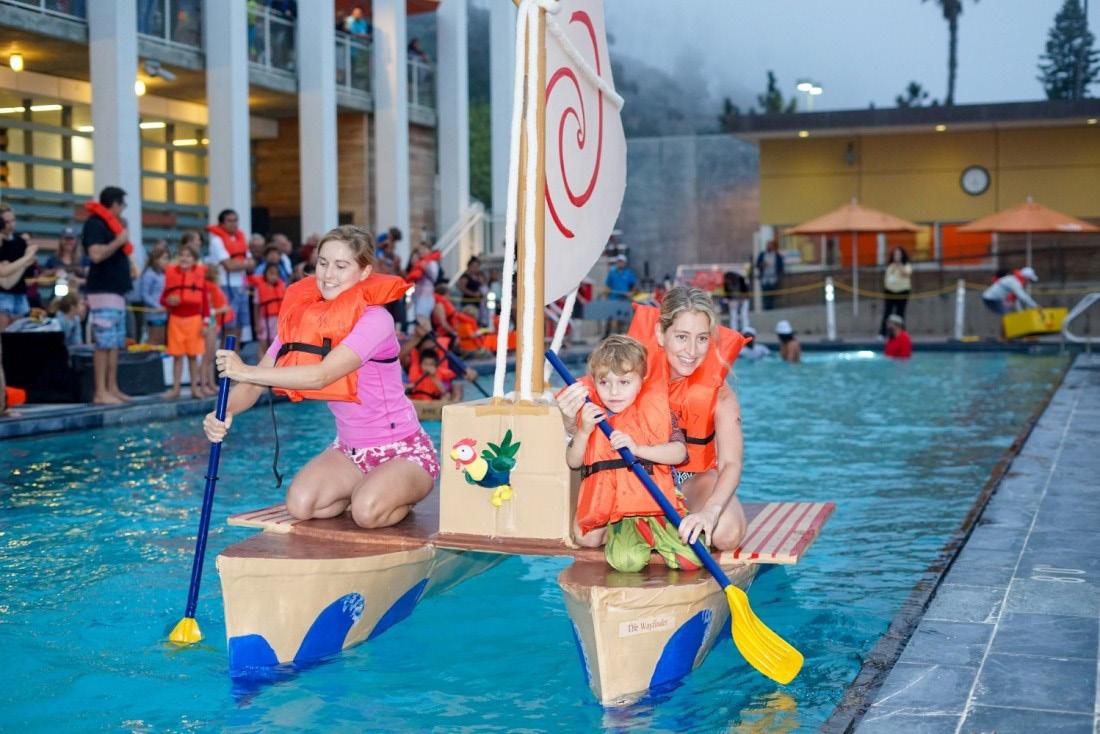
communal way to connect and revel in solstice energy. This free event is for all ages. RSVPs encouraged.
July and August events include Sunset Swim (age 18+) on Fridays July 12, & 26 and August 9 & 23.
Free events open to all ages include
Picnics on Thursdays July 18 and August 15, and Santa Monica Public Library on August 9. RSVPs are encouraged.
Summer-inspired recreation classes include stand-up paddleboard, Floating Fitness Workout, yoga, and volleyball for youth and adults, and for youth there is Bounce and semi-private swim lessons and Bounce summer camp. For more information, visit annenbergbeachhouse.com The Show Will Highlight 20 Collections, Showcasing a
The Santa Monica College Fashion Program will present its annual student fashion show, LA Mode 2024, on Friday, June 14, at 7 p.m. in the CPC Courtyard on the SMC Main Campus, 1900 Pico Blvd. The theme for this year’s event is “Timeless Style & Substance.”
Tickets for the event are priced at $25, with a discounted rate of $20 for college
students with valid ID. They can be purchased in advance at smc.edu/tickets, with a small service fee. The event kicks off at 5 p.m. with the outdoor “Peach Carpet” featuring sponsor giveaways, marketplace stalls, and opportunities for SMC alumni, students, and fashion industry guests to mingle.
The show will highlight 20 collections, showcasing a variety of styles from casual to avant-garde, created by SMC’s fashion students. The event is organized by Fashion Show Production students, under the guidance of Professors La Tanya Louis, Lorrie Ivas, and Wynn Armstrong.
The collections, developed over two years by a diverse group of students, will be judged by industry professionals, including SMC alums who now offer internships. Judges will evaluate the collections based on marketability, creativity, sustainability, technical achievement, and overall excellence, with winners announced live at the show.

The event is sponsored by the Magna Carta Foundation, with prizes donated by Netflix, Tukatech, Aims360, and other industry supporters. The Salvation Army’s Western USA Thrift Stores sponsor a sustainability challenge, “Transformed Treasures,” where students redesign “end-of-life” garments.
Additionally, the evening will honor Jade Sykes with the eighth annual Style and Substance Award for her contributions to the fashion industry and dedication to increasing minority representation.
More information is available at smc. edu/LaMode or by emailing LaMode@ smc.edu.
